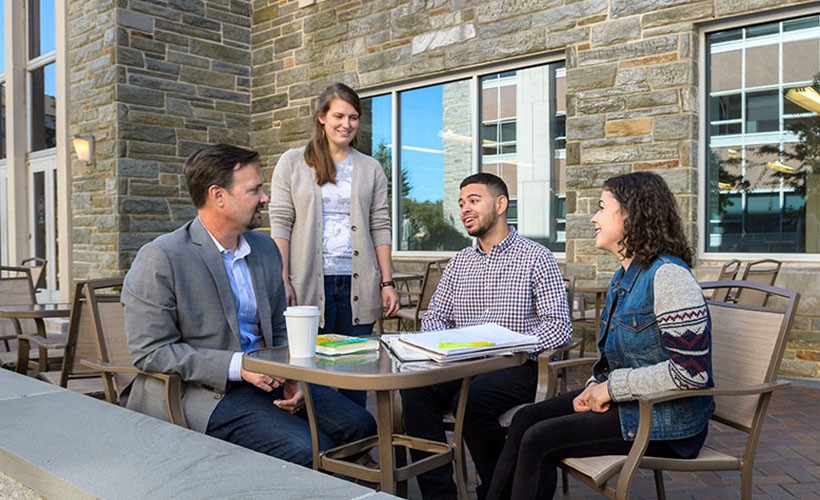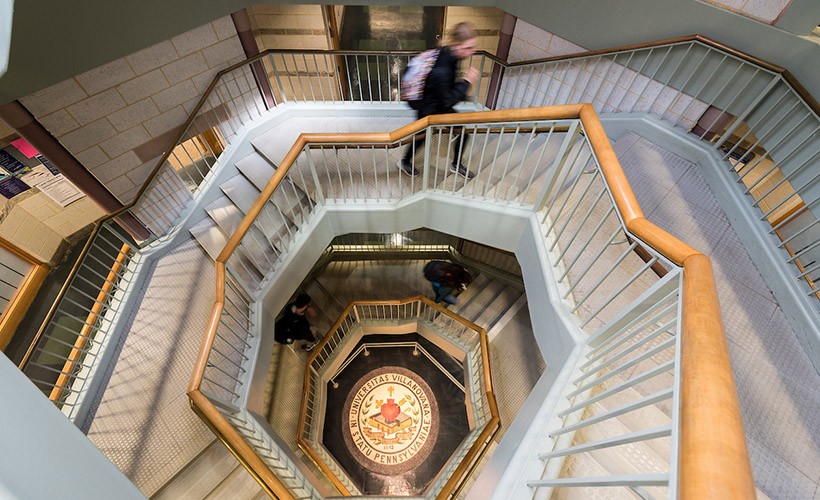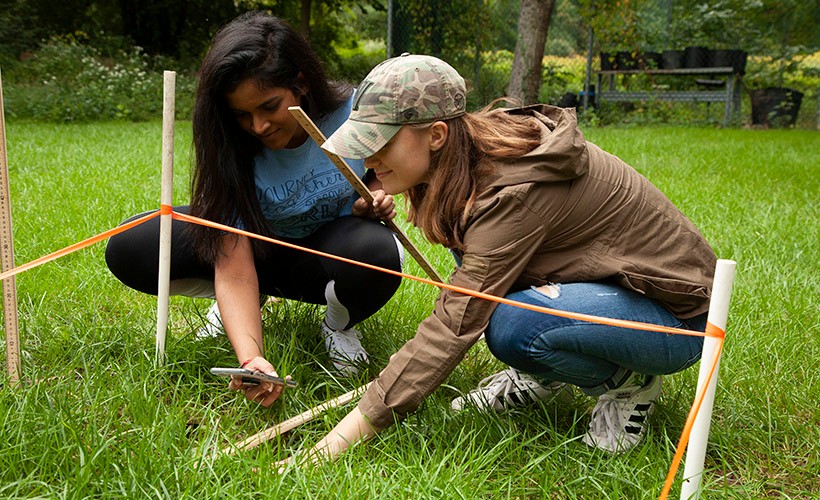GUIDING PRINCIPLES

In our department, you will join a community of students and teachers who love reading and writing, appreciate the power of language, and embrace the pleasures of great literature.
Our commitment in the Villanova English department is to help you read, write, and think with greater confidence and clarity, affording you skills you need for a satisfying career and meaningful life. In your English coursework, you will learn to express yourself both critically and creatively. You will analyze formative histories and expressive traditions of the past, as well as the most vibrant literature and culture of the twenty-first century. You will immerse yourself in literature written by diverse writers, pursuing a curriculum that embraces differences of race and ethnicity, socioeconomic status, national origin, sex, gender, gender expression, sexual orientation, body size, age, ability, religious affiliation, and legal status. The texts you read will inspire you, challenge you with difficult truths, and bring you joy. By engaging with accomplished Villanova English alumni, pursuing internships, and taking advantage of the many other career resources we provide, you will graduate prepared to use your new perspectives and skills in a profession that you love.
As Villanova English majors, you will read, discuss, write about, and craft literature. In the process, we aspire for you to meet the following learning goals and objectives:
develop intellectual curiosity, cultural empathy, and a heightened capacity to understand different points of view.
become well-versed in an array of global literary genres in English, including those by Black, Africana, Latinx, Indigenous, Asian-American and Asian writers.
become attentive to the power of language, learning to identify and evaluate the aesthetic dimensions of literary and cultural forms, including how joy, beauty, and passion inform the history and practice of reading and writing.
cultivate your imagination and learn how to use various literary techniques and devices through the practice of creative writing.
explore challenging questions of human experience, including issues of social justice, and the intersections of race, gender, class, sexuality, disability, ethnicity, environment, and faith.
employ the disciplinary vocabulary of English studies to interpret a wide variety of texts and assess their historical, cultural, and political contexts.
develop expertise in writing cogent, evidence-based arguments, expressed in clear, persuasive, insightful, and well-organized prose.
learn how to conduct research, consulting legitimate sources to advance your thinking and solve problems.
hone your capacity to listen carefully and speak effectively.
take part in internships and other departmental career opportunities that help you move from completing your English degree to pursuing a meaningful career and living a fulfilling life.
The English Department recognizes diversity as an imperative. Because diverse identities and ideas shape in complex ways the literary traditions we seek to understand and to teach, we cannot do justice to the texts we read without foregrounding diversity itself. We define diversity broadly, as the presence of difference among faculty and students and within course content, especially but not limited to race and ethnicity, socioeconomic status, national origin, sex, gender, gender expression, sexual orientation, body style, age, ability, religious affiliation, and legal status.
Our approach builds upon the most influential developments in literary criticism in the last fifty years, which have featured a dramatic expansion of the literary canon beyond white male authors, the rise of multifaceted structures of analysis based upon evolving theories of identity and difference, and special attention to the history of subordinated subjects within national literatures. Diversity and its counterpart, inclusion, constitute an ethos and a set of principles that we can use to organize our teaching and our work with one another. Inclusion requires not merely that differences be present, but that we affirm those differences and oppose systems of oppression based on them. Rather than a goal to be achieved, we see diversity and inclusion as a process in which we must all be engaged. We can expect to make mistakes in our work to cultivate diversity, and we acknowledge that success requires us to remain committed to learning from each other and from our students. While we see demographic statistics—about our faculty, our students, and the authors and topics covered in our courses—as useful tools for measuring diversity, we also recognize that our commitment to diversity must go beyond them.
Diversity Initiatives
Find out more about our efforts to promote diversity, and feel free to reach out with questions, comments, or concerns.
We're interested in reading books that change, challenge, and expand our thinking on what's happening in our lives and in the world around us. We hope you'll find some exciting or intriguing titles on this list of what we are reading now. For those interested in reading specifically about white supremacy, policing, and racial justice, we encourage you to visit our reading list on those subjects. We would also encourage you to explore Falvey Library's diversity and inclusion subject guide.

Each semester, Tsering Wangmo Dhompa, Yumi Lee, Adrienne Perry, and Kimberly Takahata host a regular BIPOC writing hangout for the Villanova community. Any students, staff, faculty, and alumni who identify as Black, Indigenous, or people of color are welcome to join this in-person and online meetup.
At each of our hangouts, we provide creative writing prompts as well as time to share and check in. No need to see yourself as a writer in order to attend. It’s a fun, warm, and welcoming creative space. We also have pizza! See our department calendar on our home page for more specific information about upcoming meeting times and places. You can also email Professor Kimberly Takahata with questions or to express an interest in joining.
*Please see below for a summary of events last year. For upcoming events, see the calendar on our landing page or the university calendar.*
The students and faculty of Villanova English are engaged in research that speaks to contemporary conversations surrounding topics such as climate change, gender and sexuality, and the impact of racism and colonialism—historically and in the present.
Kimberly Takahata, PhD, spoke about “Indigeneity and Indigenous Life in Colonial Virginia” at the Northwestern Undergraduate Conference on Literature. Heather Hicks, PhD; Jean Lutes, PhD; Kate Neilsen, PhD; and Lisa Sewell, PhD, presented a panel on climate stories and writing for change appropriately titled “The Apocalypse Isn’t Here Yet.” Mary Mullen, PhD, presented on “Comparison, Colonial Unknowing, and Ireland” at a conference devoted to "How Victorianists (Might) Talk about Race." Yumi Lee, PhD, gave a colloquium at the University of Pennsylvania on the renewed visibility of the Korean War in American literature. Tsering Wangmo Dhompa, PhD, participated in a Tibetan Women Writing Seminar at The University of Virginia. Finally, Jean Lutes, PhD, and her student assistants (including Madeline Davids '22 MA) continue to work on the ‘Steenth Street Project, an effort to recover a book of short stories, written by the pioneering Alice Dunbar-Nelson, about Black children in turn-of-the-century New York.
Our community also benefited from the work of visiting scholars who engaged with relevant topics, such as Erin Murphy, PhD, of Boston University, who spoke at the Villanova GWS conference on “Amazons and Zombies: Margaret Cavendish’s Soldiers, Gender, and the Paradoxes of War.” In addition, as part of the 2021-2022 Esmonde Colloquium, Carissa Harris, PhD, of Temple University presented on “Twice Militant: Women’s Intersectional Anger from the 1381 Uprising to #SayHerName” and Robbie Richardson, PhD, of Princeton spoke on the place of Indigenous peoples’ bones in the history of museums in Europe and North America. Each year, a diverse group of prominent writers participate in our Literary Festival, meeting with students and offering a public reading as part of their time on campus.
Department-wide professional development: At the beginning of each monthly department meeting, English faculty share anti-racist and inclusive pedagogy resources and lead short, focused reflection exercises. Recent and upcoming topics include, among others, gender inclusive practices, advising first-generation college students, racial slurs in the literature classroom, and disability studies.
Feel free to reach out:
Dr. Yumi Lee | Committee Chair
Dr. Travis Foster
Dr. Mary Mullen
Dr. Adrienne Perry



